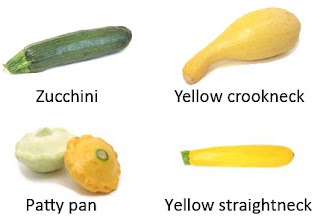Squash has been around for a long time (some believe they are to have originated in Mexico and South American over 7,500 years ago along with corn and beans). In the Americas, we've been growing and serving squash for over 5,000 years. With the name "squash" being derived from Native American works meaning "something eaten raw."
There are two categories of squash: summer and winter. Generally, summer squashes are divided into four groups: crookneck, zucchini (green & yellow), straightneck and scallop (pattypan). They all have thin edible skins and soft seeds, and are low in calories, fat and cholesterol and are a good source of fiber, vitamin C and vitamin B6.. They have tender flesh with a sweet and mild flavor - and require little to no cooking.
It is recommended that squash be salted 15 minutes prior to cooking because of their high water content and blotted dry. Dry heat cooking methods, such as stir frying, grilling, roasting or sautéing to avoid your squash turning into mush. However, steaming and simmering in a sauce work well, too.
If you find yourself with too much summer squash on hand, you can save some for later by freezing the excess. Wash and cut in 1/2-inch slices or grate. Cook in boiling water for two minutes. Drain and cool immediately in ice water. Drain and package in freezer bags, leaving 1/2-inch of head space at the top. Seal and freeze.
I'll leave you with these interesting tidbits about squash....
- Squash is one of the most important vegetable crops in New Jersey.
- Squash is related to melons and cucumbers.
- Different varieties of squad can be interchanged in recipes because they have similar texture and flavor (e.g., if a recipe calls for zucchini, you can substitute yellow squash if you don't have any zucchini on hand).
- Pumpkins are a variety of winter squash.
Sources: about.com; livestrong.com; USDA




No comments:
Post a Comment